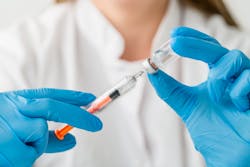The U.S. Food and Drug Administration approved Arexvy, one of the first respiratory syncytial virus (RSV) vaccines approved for use in the United States. Arexvy is approved for the prevention of lower respiratory tract disease caused by RSV in individuals 60 years of age and older.
The safety and effectiveness of Arexvy is based on the FDA’s analysis of data from an ongoing, randomized, placebo-controlled clinical study conducted in the U.S. and internationally in individuals 60 years of age and older. The main clinical study of Arexvy was designed to assess the safety and effectiveness of a single dose administered to individuals 60 years of age and older. Participants will remain in the study through three RSV seasons to assess the duration of effectiveness and the safety and effectiveness of repeat vaccination. Data for a single dose of Arexvy from the first RSV season of the study were available for the FDA’s analysis.
In this study, approximately 12,500 participants have received Arexvy and 12,500 participants have received a placebo. Among the participants who have received Arexvy and the participants who have received a placebo, the vaccine significantly reduced the risk of developing RSV-associated LRTD by 82.6% and reduced the risk of developing severe RSV-associated LRTD by 94.1%.
Among a subset of these clinical trial participants, the most commonly reported side effects by individuals who received Arexvy were injection site pain, fatigue, muscle pain, headache and joint stiffness/pain. Among all clinical trial participants, atrial fibrillation within 30 days of vaccination was reported in 10 participants who received Arexvy and 4 participants who received placebo.
In two other studies, approximately 2,500 participants 60 years of age and older received Arexvy. In one of these studies, in which some participants received Arexvy concomitantly with an FDA-approved influenza vaccine, two participants developed acute disseminated encephalomyelitis (ADEM), a rare type of inflammation that affects the brain and spinal cord, seven and 22 days, respectively, after receiving Arexvy and the influenza vaccine. One of the participants who developed ADEM died. In the other study, one participant developed Guillain-Barré syndrome (a rare disorder in which the body’s immune system damages nerve cells, causing muscle weakness and sometimes paralysis) nine days after receiving Arexvy.
The FDA is requiring the company to conduct a postmarketing study to assess the signals of serious risks for Guillain-Barré syndrome and ADEM. In addition, although not an FDA requirement, the company has committed to assess atrial fibrillation in the postmarketing study.

